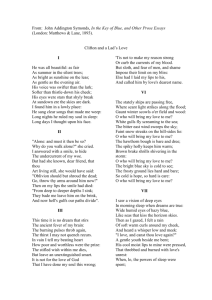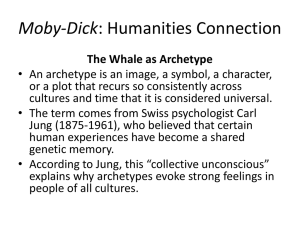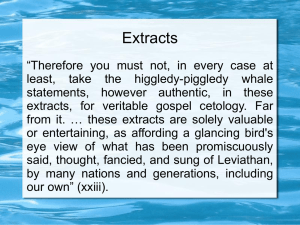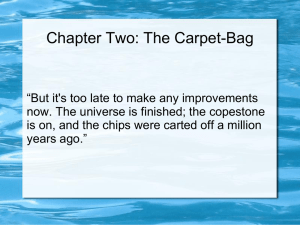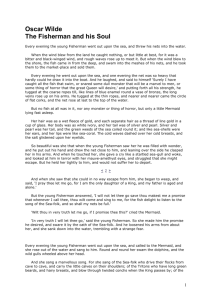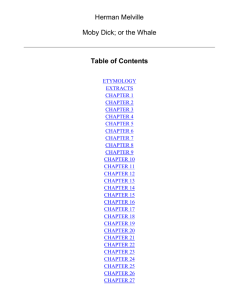herman melville, moby-dick
advertisement
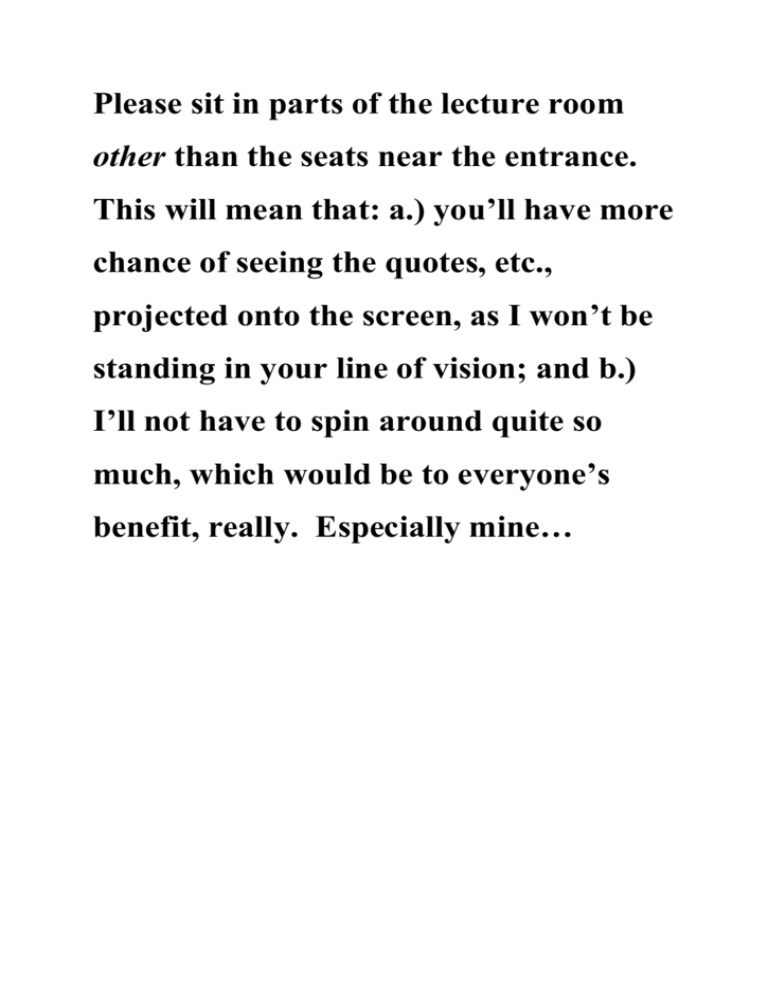
Please sit in parts of the lecture room other than the seats near the entrance. This will mean that: a.) you’ll have more chance of seeing the quotes, etc., projected onto the screen, as I won’t be standing in your line of vision; and b.) I’ll not have to spin around quite so much, which would be to everyone’s benefit, really. Especially mine… HERMAN MELVILLE, MOBY-DICK LECTURE QUOTES OWEN ROBINSON 76 Exultation is the going Of an inland soul to sea, Past the houses -- past the headlands -Into deep Eternity -Bred as we, among the mountains, Can the sailor understand The divine intoxication Of the first league out from land? Emily Dickinson (1859) 1. From Chapter 1, ‘Loomings’ Call me Ishmael. Some years ago – never mind how long precisely – having little or no money in my purse, and nothing particular to interest me on shore, I thought I would sail about a little and see the watery part of the world. It is a way I have of driving off the spleen, and regulating the circulation. Whenever I find myself growing grim about the mouth; whenever it is a damp, drizzly November in my soul; whenever I find myself involuntarily pausing before coffin warehouses, and bringing up the rear of every funeral I meet; and especially when my hypos get such an upper hand of me, that it requires a strong moral principle to prevent me from deliberately stepping into the street, and methodically knocking people’s hats off – then, I account it high time to get to see as soon as I can. This is my substitute for pistol and ball. With a philosophical flourish Cato throws himself upon his sword; I quietly take to the ship. There is nothing surprising in this. If they but knew it, almost all men in their degree, some time or other, cherish very nearly the same feelings towards the oceans with me. (Herman Melville, Moby-Dick (London: Penguin, 1992) p.3) 2. From Chapter 68, ‘The Blanket’ In life, the visible surface of the Sperm Whale is not the least among the many marvels he presents. Almost invariably it is all over crossed and re-crossed with numberless straight marks in thick array, something like those in the finest Italian line engravings. But these marks do not seem to be impressed upon the isinglass substance above mentioned, but seem to be seen through it, as if they were engraved on the body itself. Nor is this all. In some instances, to the quick, observant eye, those linear marks, as in a veritable engraving, but afford the ground for other delineations. These are heiroglyphical; that is, if you call those mysterious ciphers on the walls of pyramids hieroglyphs, then that is the proper word to use in the present connexion. By my retentive memory of the hieroglyphs upon one Sperm Whale in particular, I was much struck with a plate representing the old Indian characters chiselled on the famous hieroglyphic palisades on the banks of the Upper Mississippi. Like those mystic rocks, too, the mystic-marked whale remains indecipherable. (p.333) 3. From Chapter 79, ‘The Prairie’ Champollion deciphered the wrinkled granite hieroglyphics. But there is no Champollion to decipher the Egypt of every man’s and every being’s face. Physiognomy, like every other human science, is but a passing fable. If then, Sir William Jones, who read in thirty languages, could not read the simplest peasant’s face in its profounder and more subtle meanings, how may unlettered Ishmael hope to read the awful Chaldee of the Sperm whale’s brow? I but put that brow before you. Read it if you can. (p.380) 4. From Chapter 42, ‘The Whiteness of the Whale’ What the white whale was to Ahab, has been hinted; what, at times, he was to me, as yet remains unsaid. Aside from those more obvious connotations touching Moby Dick, which could not but occasionally wake in any man’s soul some alarm, there was another thought, or rather vague, nameless horror concerning him, which at times by its intensity completely overpowered all the rest; and yet so mystical and well nigh ineffable was it, that I almost despair of putting it in a comprehensible form. It was the whiteness of the whale that above all things appalled me. But how can I hope to explain myself here; and yet, in some dim, random way, explain myself I must, else all these chapters might be naught. 5. From Chapter 134, ‘The Chase – Second Day’ “….I’ll ten times girdle the unmeasured globe; yea and dive straight through it, but I’ll slay him yet!” “Great God! but for one instant show thyself,” cried Starbuck; “never, never wilt thou capture him, old man – In Jesus’ name no more of this, that’s worse than devil’s madness. Two days chased; twice stoved to splinters; thy very leg once more snatched from under thee; thy evil shadow gone – all good angels mobbing thee with warnings: what more wouldst thou have? – Shall we be towed by him to the infernal world? Oh, oh, – Impiety and blasphemy to hunt him more!” “Starbuck, of late I’ve felt strangely moved to thee; ever since that hour we both saw – thou know’st what, in one another’s eyes. But in this matter of the whale, be the front of thy face to me as the palm of this hand – a lipless, unfeatured blank. Ahab is forever Ahab, man. This whole act’s immutably decreed. ’Twas rehearsed by thee and me a billion years before this ocean rolled. Fool! I am the Fates’ lieutenany; I act under orders. Look thou, underling, that thou obeyest mine…” 6. From Chapter 23, ‘The Lee Shore’ Know ye, now, Bulkington? Glimpses do ye seem to see of that mortally intolerable truth; that all deep, earnest thinking is but the intrepid effort of the soul to keep the independence of her sea; while the wildest winds of heaven and earth conspire to cast her on the treacherous, slavish shore? But as in landlessness alone resides the highest truth, shoreless, indefinite as God – so, better is it to perish in that howling infinite, than be ingloriously dashed upon the lee, even if that were safety! For, worm-like, then, oh!, who would craven crawl to land! Terrors of the terrible! is all this agony so vain? Take heart, take heart, O Bulkington! Bear thee grimly, demigod! Up from the spray of thy ocean-perishing – straight up, leaps thy apotheosis! (pp.116-7) 7. From Chapter 58, ‘Brit’ Consider the subtleness of the sea; how its most dreaded creatures glide under water, unapparent for the most part, and treacherously hidden beneath the loveliest tints of azure. Consider also the devilish brilliance and beauty of many of its most remorseless tribes, as the dainty embellished shape of many species of sharks. Consider, once more, the universal cannibalism of the sea; all whose creatures pray upon each other, carrying on eternal war since the world began. Consider all this; and then turn to this green, gentle, and most docile earth; consider them both, the sea and the land; and do you not find a strange analogy to something in yourself? For as this appalling ocean surrounds the verdant land, so in the soul of man there lies on insular Tahiti, full of peace and joy, but encompassed by all the horrors of the half known life. God keep thee! Push not off from that isle, thou canst never return! (p.299)
